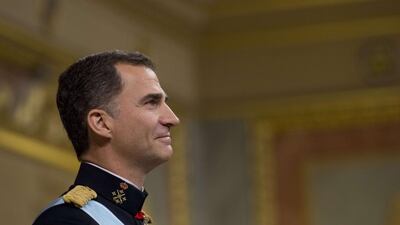As Spain wakes up to a make-or-break week that will define the future of the nation, and with the political leaders of the country and the separatist region of Catalonia engaged in a dangerously escalating war of words, many are hoping that King Felipe VI can help to broker a peaceful resolution to the crisis.
The 49-year-old became king following the abdication of his father Juan Carlos in June 2014. He is married to a TV journalist, Letizia Ortiz Rocasolano, and has two daughters. As monarch, he notionally has extensive powers, but has usually followed the example of his father, who was king during Spain’s transition from dictatorship to democracy in the 1970s, and acted on the advice of his governments.
On the day that he formally became king, he indicated that he would be a ceremonial figure, saying that he would be “a loyal head of state who is ready to listen and understand, warn and advise as well as to defend the public interest at all times”.
However, one of his roles is as guardian of the Spanish Constitution, and the crisis unfolding in Catalonia has its roots in the region’s calling a referendum which has been ruled to be unconstitutional.
The Spanish constitution of 1978 allowed regions such as Catalonia to have wide-ranging autonomy but commits them to “the indissoluble unity of the Spanish nation”. Only the Spanish parliament is allowed to change the constitution.
_______________
Read more:
Spanish police storm polling station in Catalonia independence vote
AS IT HAPPENED: Catalonia referendum
_______________
In recent years, Spain as a nation has endured testing times; it was severely hit by the financial crisis of 2008 and has seen political instability with there being no majority government returned in the last two elections in 2015 and last year.
When polled, many Spaniards have said they would like to see the king become more involved in politics; 75% of people polled by El Pais said they would approve if he were to make the political parties come to an agreement in the interests of the nation.
He has largely remained silent on the issue of Catalan independence, but on September 13 he gave a speech in which he said Spain must remain a single entity. “The Constitution will prevail over any bankruptcy of that coexistence in democracy, as it is, has been and will be the basis of our life in common and freedom, the foundation of our progress and essential pillar of our EU membership.”
Whether he will be able to appeal to Catalonians is uncertain: none of the three main parties in Catalonia support the monarchy as an institution and would be unlikely to want to keep Felipe as king if they seceded from Spain.

